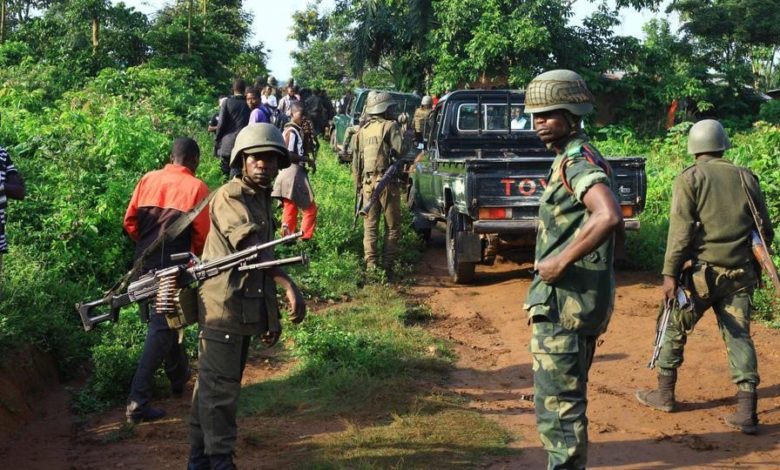Beni Massacre: Over 4,000 Killed, 190 Villages Abandoned In 6 Years
One in five of the civilian casualties were killed since August 2020, the lawmaker representing the region recently pointed out

Over 4,500 people have lost their lives to the lingering security crisis in Beni, a city located in the Democratic Republic of Congo’s North Kivu province. Repeated attacks on the community started six years ago on October 2, 2014, and have been attributed to combatants of the Allied Democratic Forces (ADF).
While giving a breakdown of the fatalities on Friday, Hon. Paul Muhindo Vahumahwa, national parliamentarian for Beni, also said more than 190 villages in the area had been abandoned by the former inhabitants, who were fleeing from the massacres.
The lawmaker revealed that of the 4,500 persons killed, he had been able to identify 3,188 victims by name. He said among the 1,048 civilian casualties, about 20 per cent were killed since August 30, 2020, following recent changes in the leadership of Operation Sokola 1.
“Usually, those leading these operations are changed but not the unit commanders nor the troops engaged in the operations on the ground which means that till date we have commanders of soldiers who have been, for more than ten years, in Beni without being changed. Thus, they are unable to come up with any innovations because the enemy already knows all their tactics,” Hon. Muhindo suggested.
The parliamentarian revealed that on the list of persons killed, the Nandes, who constitute the majority ethnic group in Greater North Kivu are on top with over 83 per cent of the victims. They are followed by the Mbubas with 15 per cent and the Talinges with 0.8 per cent. Pygmies constitute 0.5 per cent of the deceased and the Biras and Pakombes trailed with 0.3 per cent and 0.2 per cent respectively.
Hon. Muhindo said, between 2009 and 2014, more than 2,700 civilians were abducted in the Beni region by ADF rebels adding that, once taken into the bushes, the kidnapped persons were forced to become combatants or used as human shields during clashes with regular Congolese government forces.
The Member of Parliament lamented that people in the region were often treated as accomplices to the ADF fighters even though they did not shy away from collaborating with the competent authorities, including the security forces whom they alerted on the movement of assailants.
“The populations of Beni have always collaborated with the armed forces in their fight against the slaughterers. And in any case, the local population always alerts the armed forces and soldiers of the United Nations Organisation Stabilisation Mission in the Democratic Republic of Congo (MONUSCO) on 90 per cent of the attacks,” he said.
“Unfortunately, after the said alerts, they are usually abandoned to their sad fate. Do you know that the first persons killed on October 2, 2014, in Mukoko were persons who were accompanying the late General Bauma? They were called Kabagambe Amoti and Jean Pierre Kambale. Is it normal that someone who has lost his mother, his children, his wife, his house burnt, chased away from his farm and who becomes a displaced person in his own territory, becomes an accomplice to his own destruction? No and no.”
The parliamentarian suspects Uganda and Rwanda of having a hand in the massacres going on in the Beni region.
“The fallback bases of the slaughterers of Beni are in Rwanda and Uganda. They are facilitated by certain Congolese marionettes, a thing which has always been confirmed and repeated by those who were captured and held prisoners. We see people regularly entering from Rwanda, Tanzania and Uganda for unexplained motives,” he said.
The lawmaker also accused the United Nations troops deployed on the ground of being inefficient. According to him, it is necessary for the Congolese forces to readapt their tactics by transferring out of Eastern Congo all units that have served in the Beni region for a long time. He recommends a rigorous control by the National Assembly of the situation in the region.
It should be recalled that Mbusa Nyamwisi, one of the leaders of the Beni region, recently expressed joy following the announcement that a census would be conducted of all the national army soldiers in the region. He stated that it was beneficial for the government to know exactly how many soldiers were fighting in Beni. President Felix Tshisekedi recently gave the figure of Congolese soldiers fighting the ADF rebels in Eastern Congo as 21,000.
Support Our Journalism
There are millions of ordinary people affected by conflict in Africa whose stories are missing in the mainstream media. HumAngle is determined to tell those challenging and under-reported stories, hoping that the people impacted by these conflicts will find the safety and security they deserve.
To ensure that we continue to provide public service coverage, we have a small favour to ask you. We want you to be part of our journalistic endeavour by contributing a token to us.
Your donation will further promote a robust, free, and independent media.
Donate HereStay Closer To The Stories That Matter




